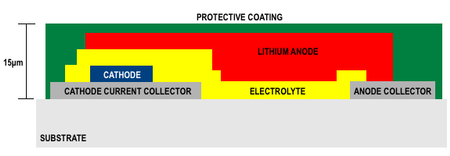This article is more than 1 year old
Japanese first to mass-produce tiny 'safe' lithium battery
No electrolyte to leak or explode, it's claimed
Japan's Ulvac has become the first company to put solid-state thin-film lithium batteries into mass production, it claimed this week.
Ulvac's pitching the power source as an alternative to today's lithium-ion rechargeables, specifically by stressing that its design contains no liquid electrolyte and therefore is incapable of... well.. blowing up.
The company also claimed its battery design is thin, lightweight and can be made applied to flexible materials.
The batteries are made using the thin-film deposition process, applying lithium cobalt cathode, (solid) lithium phosphate electrolyte and lithium anode layers to a substrate material. With a protective coating applied, the battery is no more than 15µm thick, excluding the substrate.

Ulvac said it sees the battery technology being applied to particularly small devices, such as medical sensors and near-field communications kit, and in secondary power-supply roles in larger devices.
The company indicated it is researching ways to make the technology bigger, to power mobile devices and, ultimately, electric vehicles.
It also wants to explore connecting microelectromechanical systems (MEMS) to the battery. Such devices could be used to convert, say, a device's motion into electrical power that can then be stored in its thin-film lithium batteries.
